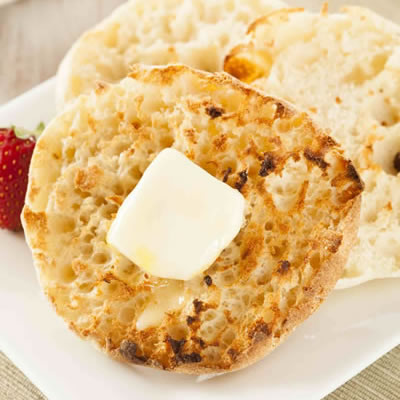Chemical structure
Function
SAS is commonly used in combination with monocalcium phosphate in double-acting baking powders. It does not react with baking soda until it is-above 140 oF.2
In chocolate cake production, SAS will impart a light milk chocolate color to the crumb. In english muffins, SAS-based baking powders release gas quickly when the muffin is deposited onto a hot griddle which creates the desired large gas holes.
In tortillas, SAS promotes blistering which imparts a tender texture to the tortilla. SAS is unfortunately high in sodium.
Commercial production
SAS is produced by the reaction of sodium sulfate and aluminum sulfate.
Application
SAS should be used in conjunction with baking soda. Its most common application would be in double-acting baking powder.
SAS is a leavening acid commonly found in baked goods. It has a neutralizing value of 104 and very slow reaction rate. The neutralizing value of leavening acids is the ratio of sodium bicarbonate (baking soda) to 100 parts of acid leavener that will bring about complete carbon dioxide release or “neutralization.” Adjusting the amount of leavening acid to baking soda can raise (decrease acid amount) or lower (increase the acid amount) the pH of the finished product, if desired.
When applying SAS as the leavening acid, the acid-to-base ratio has an important effect on final product quality. Research found that when preparing tortilla, the acid-to-base ratio influences the opacity, pH, rollability, shelf-stability, specific volume, extensibility of the final product.3
FDA regulation
SAS is GRAS regulated by FDA in the article 21CFR582.1131.4
References
- “Sodium Aluminum Sulfate, Anhydrous .” Sodium Aluminum Sulfate, Anhydrous by Vitusa Products, Inc. – Food, Beverage & Nutrition. www.ulprospector.com/en/na/Food/Detail/11062/334928/Sodium-Aluminum-Sulfate–Anhydrous. Accessed 13 Apr. 2017.
- “Double-Acting Baking Powder | Baking Ingredients.” Bakerpedia. www.bakerpedia.com/ingredients/double-acting-baking-powder/. Accessed 13 Apr. 2017
- Bejosano, Feliciano P., and Ralph D. Waniska. “Functionality of Biocarbonate Leaveners in Wheat Flour Tortillas.” Cereal Chem. 81.1 (2003): 77-79.
- “CFR – Code of Federal Regulations 21CFR582.1131.” Accessdata.fda.gov. 01 Apr. 2016. www.accessdata.fda.gov/scripts/cdrh/cfdocs/cfcfr/CFRSearch.cfm?fr=582.1131. Accessed 13 Apr. 2017.


